The Era of Easy Money Ruined Us
January 30, 2024
The rot caused by easy money will only become fully visible when the hollowed out institutions start collapsing under the weight of incompetence, debt and hubris.
We have yet to reach a full reckoning of the consequences of the era of easy money, but it's abundantly clear that it ruined us. The damage was incremental at first, but the perverse incentives and distortions of easy money--zero-interest rate policy (ZIRP), credit available without limits to those who are more equal than others--accelerated the institutionalization of these toxic dynamics throughout the economy and society.
Fifteen long years later, the damage cannot be undone because the entire status quo is now dependent on the easy-money bubble for its survival. Should the bubbles inflated by easy money pop, the financial system and the economy will collapse into a putrid heap, undone by the perversions and distortions of endless easy money.
Easy money created destructive, mutually reinforcing distortions on multiple fronts. Let's examine the primary ways easy money led to ruin.
1. The near-zero rate credit was distributed asymmetrically; only the wealthiest few had access to the open spigot of "free money." The rest of us saw mortgage rates decline, but we were still paying much higher rates of interest than corporations, banks and financiers.
If we'd all been given the opportunity to borrow a couple million dollars at 1% and put the easy money into bonds yielding 2.5%, skimming a low-risk 1.5% for producing nothing, we'd have jumped on it. But that opportunity was only available to banks, the super-wealthy, corporations and financiers.
The charts below show the perverse consequences of offering the wealthiest few limitless money at near-zero rates while the rest of us paid much higher interest. The wealthiest few could buy income-producing assets on the cheap at carrying costs no ordinary investor could match. Since there was so much "free money" sloshing around for financial elites to tap, the demand for income-producing assets soared, pushing prices into the stratosphere. These enormous increases in valuation generated stupendous capital gains for the wealthiest few.
Look at 2009 as the starting point in these charts, as that's when the Federal Reserve instituted ZIRP and opened the spigots of easy money to "those with first access," i.e. banks, corporations and financiers.
Here we see how the assets of the top 0.1% more than tripled since 2009, far outpacing inflation.
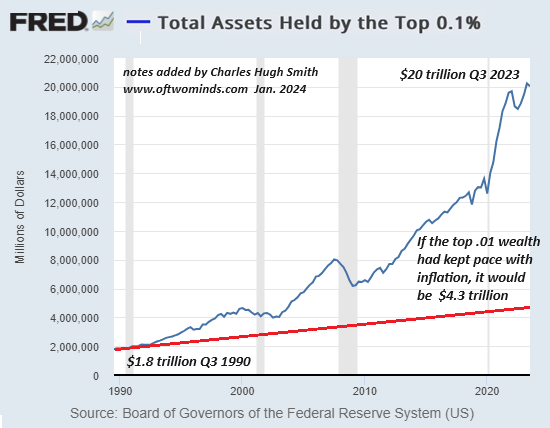
The net worth of the top 1% went ballistic as well. Nearly free credit is rocket fuel if you're first in line and nobody else gets the same interest rate.
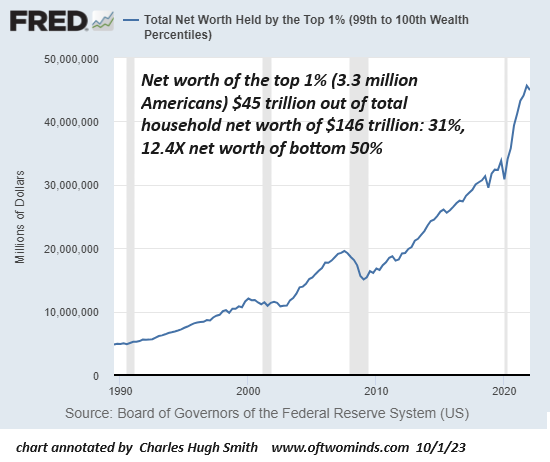
The bottom 50% of American households lost ground in the era of easy money. This is not coincidence, it's direct causation: give the lowest interest rates and unlimited credit to the wealthy, and they will buy up the most productive assets, leaving crumbs for the rest of the American citizenry.
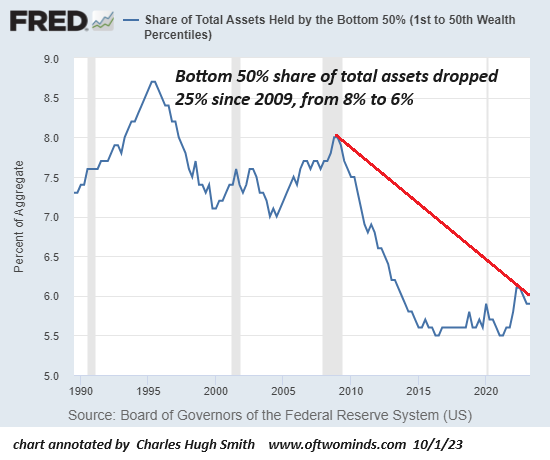
Here's the Fed balance sheet, the money they created out of thin air and injected into the cheap-unlimited-credit-for-the-wealthy machine.
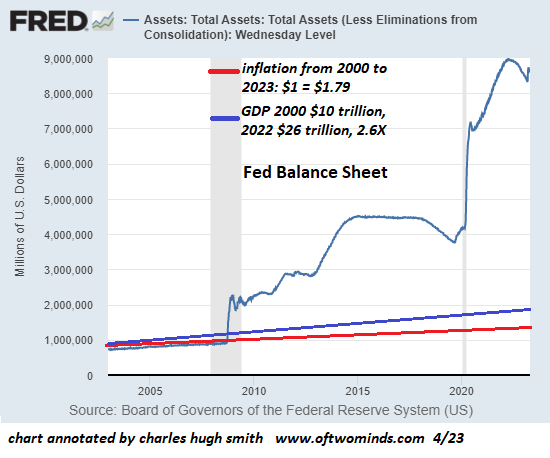
Note how the easy money sparked federal borrowing. Federal debt was under the line of GDP expansion until 2009, at which point it took off in a parabolic ascent. Now that interest rates have finally normalized a bit, the gargantuan interest on this debt will be extracted from the citizenry via higher taxes and/or reduced federal spending. (Giveaways to wealthy political donors will of course remain untouched, along with tax havens for the super-wealthy.)
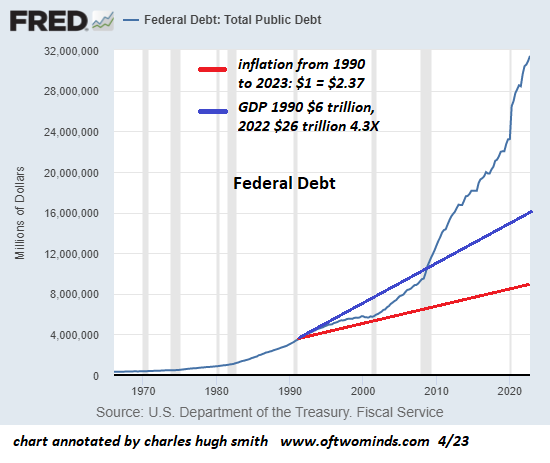
The social perversions of easy money are equally destructive. When it's cheap and easy to borrow more money, that becomes the "obvious" way to deal with challenges. This incentivizes enterprises and institutions to advance those with skills in finance and PR rather than in management.
With the discipline imposed by the cost of money gone and the expansion of opportunities to reap fortunes by pyramiding credit and leverage, competency was redefined from management focused on increasing productivity and cutting costs through efficiencies to extracting the soaring value of existing assets: nothing new was produced but yowza, a lot of people sure got rich.
The rot created by easy money has seeped into every fiber of our social, political and economic orders. Correspondent D.T. drew a direct line between easy money and the decline of competence in The Powers That Be:
"Nepo(tism) babies selected by accident of birth without any tempering in flames... cocooned in their own reality, disdainful of the unselected, coddled and hothoused, ignorant of history and, worst of all, supremely confident in the superiority of their own righteous abilities... because when you get first dibs on the free money there are no consequences you can't buy your way out of."
Is there any doubt that what some are calling The Disconnected Elite (DE) have fortified their Ivy League-luxe-enclave bubbles and unearned privileges with the easy money that comes with their position atop the heap? The cost of this elevation of incompetence, the complete disconnection from the realities of everyday Americans and the hubristic confidence in their own talent--i.e., believing your own PR--has hollowed out the nation's institutions in ways those outside the institution cannot yet observe.
The rot caused by easy money will only become fully visible when the hollowed out institutions start collapsing under the weight of incompetence, debt and hubris.
New podcast:
Self Reliance (45 min).
My recent books:
Disclosure: As an Amazon Associate I earn from qualifying purchases originated via links to Amazon products on this site.
The Asian Heroine Who Seduced Me (Novel) print $10.95, Kindle $6.95 Read an excerpt for free (PDF)
When You Can't Go On: Burnout, Reckoning and Renewal $18 print, $8.95 Kindle ebook; audiobook Read the first section for free (PDF)
Global Crisis, National Renewal: A (Revolutionary) Grand Strategy for the United States (Kindle $9.95, print $24, audiobook) Read Chapter One for free (PDF).
A Hacker's Teleology: Sharing the Wealth of Our Shrinking Planet (Kindle $8.95, print $20, audiobook $17.46) Read the first section for free (PDF).
Will You Be Richer or Poorer?: Profit, Power, and AI in a Traumatized World
(Kindle $5, print $10, audiobook) Read the first section for free (PDF).
The Adventures of the Consulting Philosopher: The Disappearance of Drake (Novel) $4.95 Kindle, $10.95 print); read the first chapters for free (PDF)
Money and Work Unchained $6.95 Kindle, $15 print) Read the first section for free
Become a $1/month patron of my work via patreon.com.
Subscribe to my Substack for free
NOTE: Contributions/subscriptions are acknowledged in the order received. Your name and email remain confidential and will not be given to any other individual, company or agency.
|
Thank you, Inform Passion ($1/month), for your most generous subscription to this site -- I am greatly honored by your support and readership. |
Thank you, Ignacio M. ($5/month), for your marvelously generous subscription to this site -- I am greatly honored by your support and readership. |
|
|
Thank you, Kenneth C. ($100), for your outrageously generous contribution to this site -- I am greatly honored by your steadfast support and readership. |
Thank you, Kheng L.T. ($50), for your magnificently generous Substack contribution to this site -- I am greatly honored by your support and readership. |